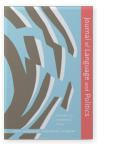Vol. 23:2 (2024) ► pp.283–305
BIOMETRIC CITIZENS in smart cities
Re-evaluating citizens’ conceptualizations in smart cities policies as extended metaphorical arguments
This article addresses the socio-cognitive conceptualizations of the notion of ‘citizenship’ within the space of smart cities. It discusses how smart cities expos are endowed with ideological bearings that mark a shift in these conceptualizations. This ideological shift is explored in the policy releases of Barcelona expo media centre 2019/2020 as retrieved from the Smart City Expo World Congress website. The framework accounts for the socio-cognitive aspects that are brought to the smart expos’ discussions, reframing it within the paradigms of Posthumanism and neoliberal urbanism. It is found that citizenship within smart city discourse is characterized by series of subjugating conflations between biovalues and biometrics, the body, technology, and the city and the citizen. These subjugations are discovered by contesting the metaphors of CITIZEN-FOCUSED URBANISM, VULNERABLE CITIZENS, and TECHNOLOGICAL SOLUTIONISM with their reframed counterparts of BIOMETRIC CITIZEN, INFRASTRUCTURE CITIZENSHIP, and TECHNOLOGICAL PATERNALISM.
Article outline
- 1.Introduction
- 2.Smart city ideals: Colluding neoliberal urbanism with Posthuman citizenship
- 3.Practical reasoning arguments
- 4.Data selection and analytical procedures
- 4.1Analytical procedures
- 5.Analysis
- 5.1Citizen-focused urbanism
- 5.2Technological solutionism
- 5.3
Reframing values as Posthuman practices in a neoliberal urbanism
- 5.3.1Citizen-focused urbanism biometric citizen
- 5.3.2Vulnerable citizens’ utopia infrastructure citizenship
- 5.3.3Technological solutionism technological paternalism
- 6.Conclusion
-
References
